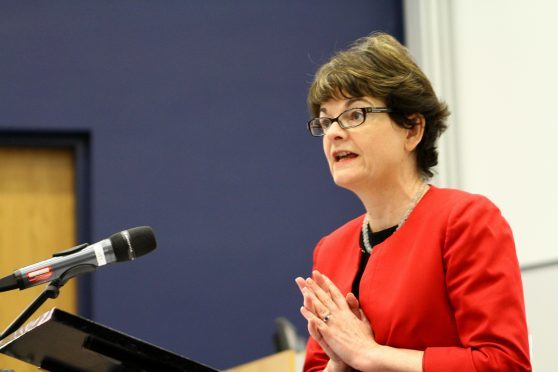The Principal of St Andrews University has criticised the cap on Scottish students for putting some candidates at a disadvantage.
Professor Sally Mapstone defended the university’s admissions policy, which provides young people facing extra challenges, such as experience of being in care, living in poor areas or caring for a relative, with a better chance of studying for a degree.
She said, combined with the Scottish Government’s cap on the number of Scottish students, who cost the public purse more because they do not pay tuition fees, it meant some candidates were missing out.
“Contextual admission does not in itself disadvantage anyone. It is the co-existence of a capped numbers policy that does that,” said Prof Mapstone.
She continued: “Scottish universities have operated contextual admissions systems for many years, not at the behest of government, but because it is the socially responsible thing to do and an effective way to ensure we recruit students with the greatest potential.
“What has changed is that for the first time as a sector, we have chosen to present those different routes to university entry in our prospectuses and online to make the process clearer for all concerned.
“We know from experience that exam grades alone are not the best indicator of those most likely to succeed, unless life circumstances are also taken into account.”
At St Andrews, the Gateway to Medicine programme allows candidates with Scottish Higher grades BBBB in fifth year entry to the course. Otherwise, the minimum requirement would be Higher grades AAABB in fifth year.
Prof Mapstone added: “In St Andrews, contextual admission is one of a range of measures, alongside extensive outreach, summer schools and academic gateway programmes, which has meant that 49% of our current entrant class of Scottish students has a widening participation background.
“That is a statistic worth pondering. More young people from non-traditional university backgrounds are getting into university than ever before, but it also means that competition for places at our most selective universities is more intense and has more profound social consequences than ever before.
“We must also acknowledge that contextual admission is just one step. Universities have to make sure that they have resources for support systems and generous bursary and scholarship assistance available for applicants with potential, many of whom lack basic means and cannot rely on traditional family support models.”
The Scottish Government said the number of Scots being offered a place at university was at a record high.
A spokesperson for the government said: “Access thresholds are about raising standards by ensuring talent is evaluated fairly and they have the potential to make a significant contribution to reducing inequalities in higher education.
“The number of Scots winning a place at university is at a record high, as is the number of students attending university from the most deprived backgrounds.
“We remain firmly of the view that access to education should be based on the ability to learn and not the ability to pay, which is why we abolished tuition fees in Scotland and continue to provide over £1 billion to the university sector each year.”










